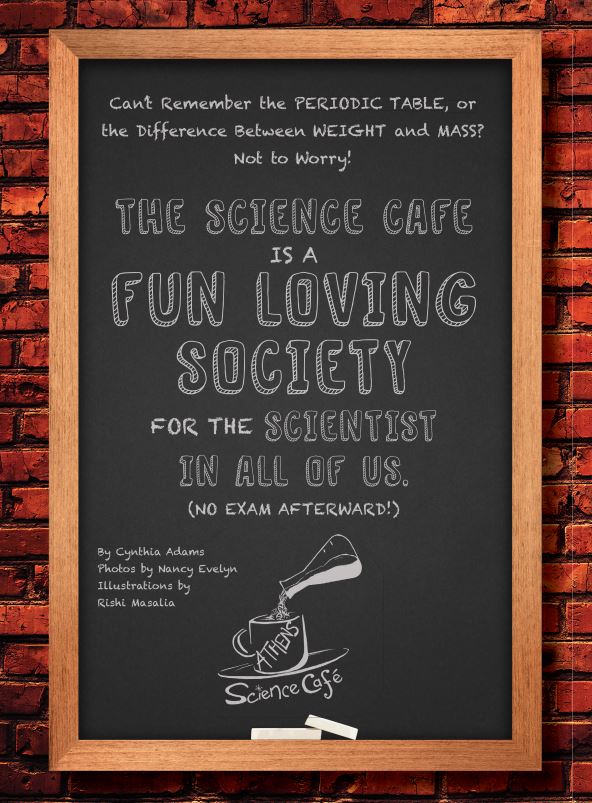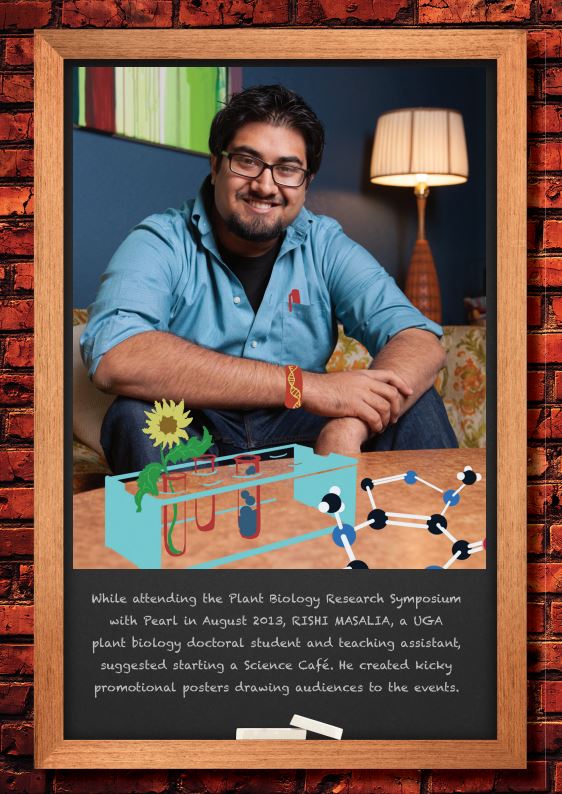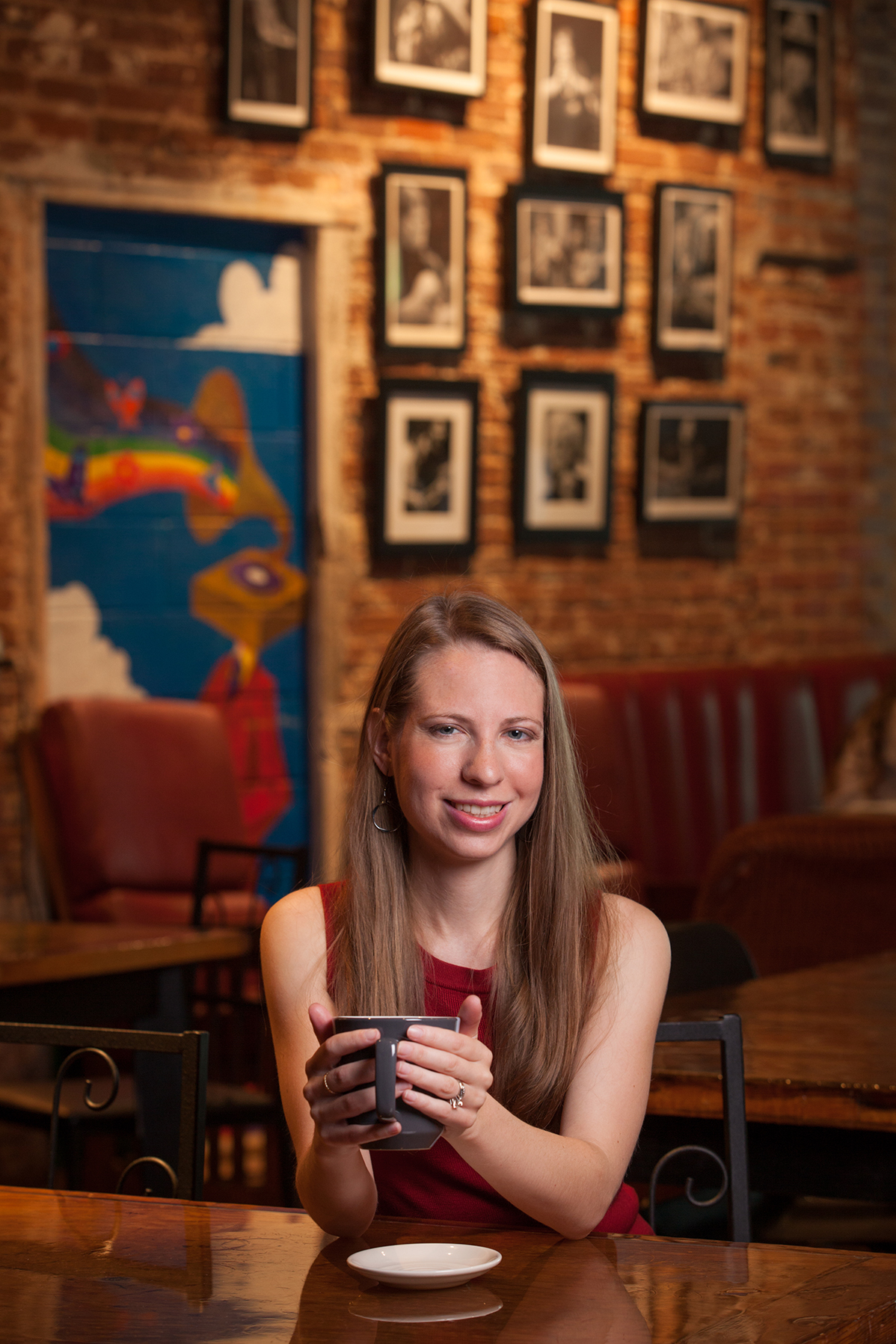Science Cafe

By: Cynthia Adams | Photos By: Nancy Evelyn
SCIENCE CAFE organizers and scientists break down hard science into appetizing servings. “The Science of L-O-V-E,” “4-1-1 on GMOS,” and “Winds of Change” were early topics. Each were slurped up by thirsty audiences. Stephanie Pearl, UGA postdoctoral fellow, helped organize Athens’ brand of SCIENCE CAFE.
Can’t remember the periodic table? Or the difference between weight and mass? Not to worry! The SCIENCE CAFE is a fun loving society for the scientist in all of us. (No exam afterward!)
SCIENCE CAFÉS take science to the people worldwide—bringing scientists into a friendly and fun setting. “I co-created a communications seminar a couple of years ago, then became more involved after taking a course in communicating science,” Pearl says.
Stephanie Pearl, an organizer of Science Café in Athens, stirs her coffee to cool it before heading over to the lab. Pearl wears a scarf looped around her neck. She not only looks too young to be a PhD, but could easily pass for an artist. But Pearl is a bona fide plant scientist.
Scott Jackson is a Georgia Research Alliance Eminent Scholar known for his peanut research. Pearl wrote her dissertation on safflower oil last year, and afterward found an opportunity to do postdoctoral work within Jackson’s lab.
Pearl loves science. And what is great fun at the moment is advancing the cause of Athens’ Science Café, taking place in friendly settings like the bakery where Pearl sits. She explains the premise. The grassroots movement brings scientists directly to the public. Science Cafés are springing up around the globe, especially in popular community gathering places and homey cafes.
Last summer, Pearl began working with a group of key players in support of the idea taking root in Athens. Rishi Masalia, a plant biology doctoral student and teaching assistant, pressed for the venture to happen in the first place.
While both attended the Plant Biology Research Symposium in August 2013, “Rishi suggested starting a Science Café,” Pearl says. Others who knew about the Science Café phenomenon were thinking the same.
“Terry Hastings and Rishi Masalia both independently thought of having an Athens Science Café,” she recalls. Their first meeting took place at the beginning of October, only two months later. “I helped make it happen, and the four of us, Terry, Rishi, James Hataway and I, have been working on it since the first meeting.”
Things moved quickly, and Masalia prepared kicky promotional posters. The events were billed with tongue-in cheek pop cultural references. And oh, how it worked!
On February 25, psychology department head Keith Campbell presented “The Science of L-O-V-E” at Ciné downtown. In the spirit of things, Ciné offered Love Potion #9, a special cocktail for the event. Pearl describes the scene:
“At the first one, there was standing room only—about 100 people! There were grad students, post docs, some of the UGA public relations people.” Plus, she spotted a large number of graduate students from plant biology and genetics.
On March 18, they staged a second café downtown led by UGA professor Wayne Parrott titled, “The 4-1-1 on GMOs” at The Globe on Lumpkin Street downtown. Pearl says they began using social media and did live tweeting from the event. The third café, “Winds of Change: Using Social Media to Study the Weather,” was led April 23 by Professor John Knox at Hendershot’s coffee and bar downtown.
Meredith Welch-Devine compares Science Café to TED Talks, a nonprofit that creates conferences based on “ideas worth spreading.” But with Science Café, the setting is potentially anywhere. “You put the professor in a bar,” she says.
“The idea,” as Welch-Devine explains, “is that of breaking down the walls of the ivory tower.”
Stony Brook University offers a series of bar talks titled, “Science on Tap.” Welch-Devine, who works in the Graduate School, attended a seminar at the Alan Alda Center for Communicating Science a few years ago. The experience inspired new initiatives, expressly aimed at teaching graduate students to better communicate scientific ideas.
Alda, a famous pitch man for science, was interviewed by The New York Times in February of this year. He said, “Scientists often don’t speak to the rest of us the way they would if we were standing there full of curiosity.” The actor summarized the problem.
“If a scientist doesn’t have someone next to them, drawing them out, they can easily go into lecture mode…a lot of insider’s jargon. If they can’t make clear what their work involves, the public will resist advances. They won’t fund science.”
In Athens’ first forays, Science Café ignited eureka moments for the average Joe and Jill—and the scientists and community become interactive players in the zeitgeist of the moment. From what attendees say, the public is thirsty for more than just a brew. They wanted knowledge. Reviews in the local press were equally enthusiastic.
“When did you last see a bar with standing room only for people who came just to hear about genetics?” asks a photographer who attended the session at the Globe.
And Pearl couldn’t be more pleased, even though the challenge to find venues and pay for costs is, well, a challenge.
“Money is an issue,” she admits, but says organizers met with helpful academic program heads and the science library for additional support. They agreed to something a bit old fashioned. Herb and bake sales were soon launched to raise Science Café funds.

Lots of Good Bar Hands
Pearl says, “The folks who were there who are still involved are Rishi, James Hataway, Terry Hastings, and I.” Hastings is director of research communications at UGA. Hataway works in the office of the vice president for research.
The concept is still new and so is the enthusiasm of the core group. Masalia still creates visuals for the meetings. Meanwhile, Pearl vets possible venues, calls meetings, helps with speaker arrangements, and works with Hataway and science writer April Sorrow to get stories out to the public. During cafés, Hataway serves as the moderator.
With an affable vibe, Pearl fits the science ambassador slot nicely. She credits the team effort of Hastings, and science writers and public relations specialists like Hataway and Sorrow with getting the message to the public.
Pearl steers the conversation away from herself, talking up the Science Café on an early midweek morning, although the blue-eyed, brown-haired multi-tasker has lab work aplenty waiting for her afterward. Her breakfast pastry can wait, and Pearl ignores it.
“The traditional mindset is you pursue a post-graduate research career after a doctorate,” Pearl says. “It’s not realistic. You have to seek other options and avenues.”
She not only pursued science, but studied piano for 17 years and could have easily become a musician. Also, she studies tap and jazz dance at the Dance FX studio in Athens. This segues to STEM disciplines (science, technology, engineering and math) versus STEAM disciplines. STEAM includes the STEM disciplines while acknowledging the “A”—the crucial role of arts.
In many ways, Pearl is the face of the new scientist, increasingly challenged to take their work and knowledge to the public in the interest of funding and overcoming misinformation.
Her fascination with the Science Café was born out of her conviction that she couldn’t do much with her doctorate if she didn’t develop teaching and communicating skills. Science Café created an opening for her and others like Pearl to take what they know to a general audience.
“And in a nutshell, it is just fun,” Pearl says.
“People may be scientists at heart, but want to have fun with science and don’t get that opportunity,” she adds. “We’re a community organization, not a university one.” With the force of brain power behind them, Science Café offers serious fun.









